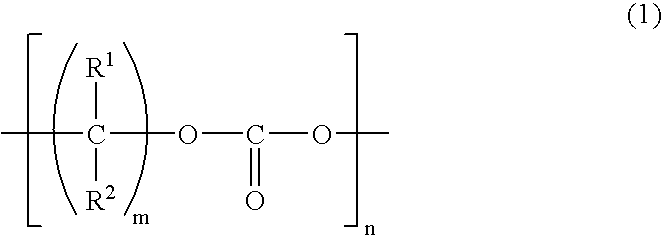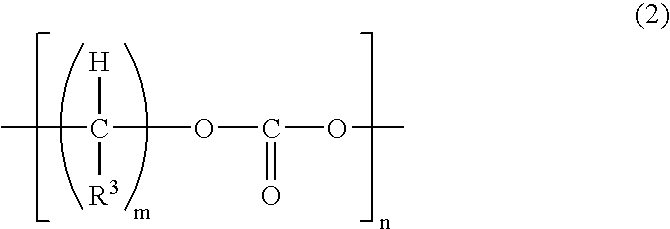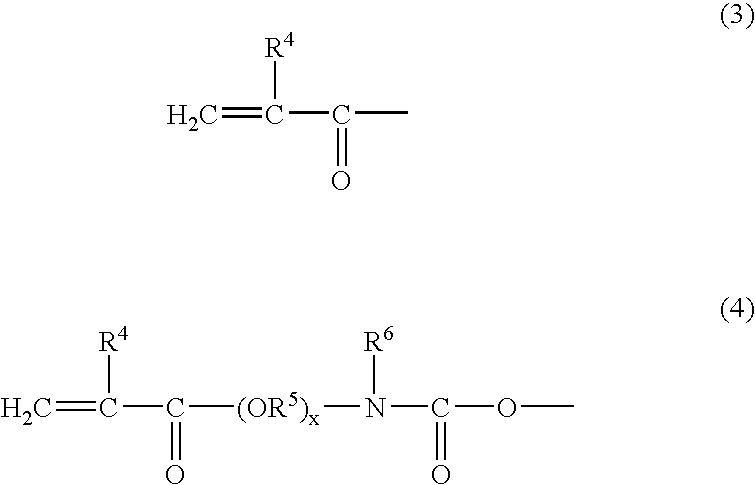Polymerizable composition and use thereof
a polymerizable composition and composition technology, applied in the field of polymerizable composition, can solve the problems of small device takeout current, reduced safety and reliability, and reduced ionic conductivity or deterioration, and achieve the effect of high electronic conductan
- Summary
- Abstract
- Description
- Claims
- Application Information
AI Technical Summary
Benefits of technology
Problems solved by technology
Method used
Image
Examples
example 1
[0140] Synthesis of Polymerizable Compound (Compound 2)
[0141] Carbonate-diol (produced by Nippon Polyurethane, mass average molecular weight: 500) (Compound 1) and methacrylate having an isocyanate group (produced by Showa Denko K.K.) (MI) were reacted according to the reaction formula shown below and a polymerizable compound (Compound 2) was obtained through the following procedure. 14
[0142] Specifically, 50.0 g of dehydrated Compound 1 (mass average molecular weight: 500, hydroxyl group value: 224 KOHmg / g, water content: 30 ppm) and 32.0 g of MI were reacted in dry air at 50.degree. C. for about 5 hours while adding 0.1 g of dibutyltin dilaurate, and as a result, a colorless viscous liquid was obtained. It was found from .sup.1H-NMR and .sup.13C-NMR that Compound 1 and MI were reacted at 1:2, and since the absorption of isocyanate group of Compound 1 disappeared from the infrared absorption spectrum, a urethane bond was produced, and thus revealing the production of Compound 2. Th...
example 2
[0143] Synthesis of Polymerizable Compound (Compound 3)
[0144] Compound 1 and commercially available methacrylic acid (MA) were reacted according to the reaction formula shown below and a polymerizable compound (Compound 3) was obtained through the following procedure. 15
[0145] Specifically, 50.0 g of Compound 1 and 20.0 g of MA were reacted in benzene at 90.degree. C. for about 10 hours while adding thereto 2.2 g of p-toluenesulfonic acid (PTS). Thereafter, the reaction solution was neutralized with an aqueous NaOH solution and then subjected to water washing and dehydration. As a result, a colorless viscous liquid was obtained. It was found from .sup.1H-NMR and .sup.13C-NMR that Compound 1 and MA were reacted at 1:2 to produce Compound 3.
[0146] The mass average molecular weight of this compound, determined by GPC, was 650 and the viscosity at 25.degree. C., was 230 mPa.multidot.s.
example 3
[0147] synthesis of polymerizable compound mixture (mixture of Compound 5 and Compound 6)
[0148] A mixture of Compound 1 and Compound 4 (1:1 by mol) and a commercially available acrylic acid (M) were reacted according to the reaction formula shown below and a polymerizable compound (a mixture of Compound 5 and Compound 6) was obtained through the following procedure.
[0149] Specifically, 50.0 g of a 1:1 (by mol) mixture (mass average molecular weight: 500, hydroxyl group value: 180 KOHmg / g) of Compound 1 and Compound 4 and 12.0 g of M were reacted in benzene at 90.degree. C for about 10 hours while adding thereto 1.5 g of PTS. Thereafter, the reaction solution was neutralized with an aqueous NaOH solution and then subjected to water washing and dehydration. As a result, a colorless viscous liquid was obtained. It was found from .sup.1H-NMR and .sup.13C-NMR that Compound 1, Compound 4 and AA were reacted at 1:1:3 to produce a mixture of Compound 5 and Compound 6.
[0150] The mass average...
PUM
| Property | Measurement | Unit |
|---|---|---|
| temperature | aaaaa | aaaaa |
| viscosity | aaaaa | aaaaa |
| viscosity | aaaaa | aaaaa |
Abstract
Description
Claims
Application Information
 Login to View More
Login to View More - R&D
- Intellectual Property
- Life Sciences
- Materials
- Tech Scout
- Unparalleled Data Quality
- Higher Quality Content
- 60% Fewer Hallucinations
Browse by: Latest US Patents, China's latest patents, Technical Efficacy Thesaurus, Application Domain, Technology Topic, Popular Technical Reports.
© 2025 PatSnap. All rights reserved.Legal|Privacy policy|Modern Slavery Act Transparency Statement|Sitemap|About US| Contact US: help@patsnap.com



